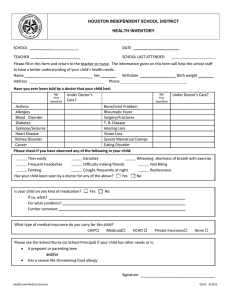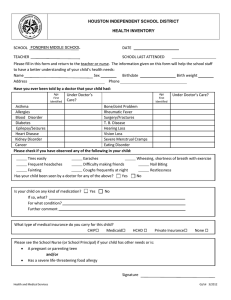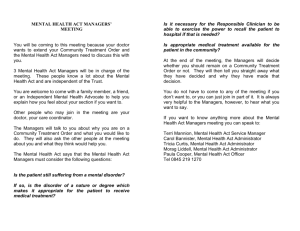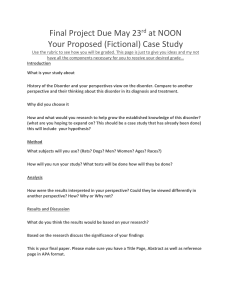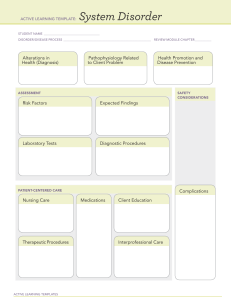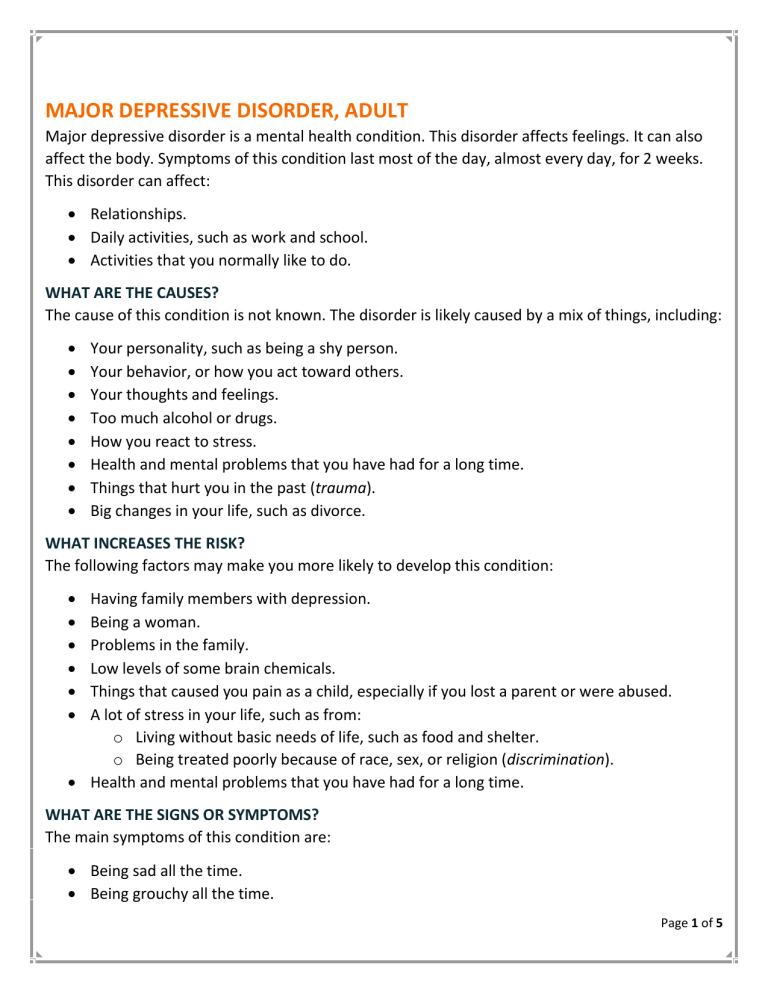
MAJOR DEPRESSIVE DISORDER, ADULT Major depressive disorder is a mental health condition. This disorder affects feelings. It can also affect the body. Symptoms of this condition last most of the day, almost every day, for 2 weeks. This disorder can affect: Relationships. Daily activities, such as work and school. Activities that you normally like to do. WHAT ARE THE CAUSES? The cause of this condition is not known. The disorder is likely caused by a mix of things, including: Your personality, such as being a shy person. Your behavior, or how you act toward others. Your thoughts and feelings. Too much alcohol or drugs. How you react to stress. Health and mental problems that you have had for a long time. Things that hurt you in the past (trauma). Big changes in your life, such as divorce. WHAT INCREASES THE RISK? The following factors may make you more likely to develop this condition: Having family members with depression. Being a woman. Problems in the family. Low levels of some brain chemicals. Things that caused you pain as a child, especially if you lost a parent or were abused. A lot of stress in your life, such as from: o Living without basic needs of life, such as food and shelter. o Being treated poorly because of race, sex, or religion (discrimination). Health and mental problems that you have had for a long time. WHAT ARE THE SIGNS OR SYMPTOMS? The main symptoms of this condition are: Being sad all the time. Being grouchy all the time. Page 1 of 5 Loss of interest in things and activities. Other symptoms include: Sleeping too much or too little. Eating too much or too little. Gaining or losing weight, without knowing why. Feeling tired or having low energy. Being restless and weak. Feeling hopeless, worthless, or guilty. Trouble thinking clearly or making decisions. Thoughts of hurting yourself or others, or thoughts of ending your life. Spending a lot of time alone. Inability to complete common tasks of daily life. If you have very bad MDD, you may: Believe things that are not true. Hear, see, taste, or feel things that are not there. Have mild depression that lasts for at least 2 years. Feel very sad and hopeless. Have trouble speaking or moving. HOW IS THIS TREATED? This condition may be treated with: Talk therapy. This teaches you to know bad thoughts, feelings, and actions and how to change them. o This can also help you to communicate with others. o This can be done with members of your family. Medicines. These can be used to treat worry (anxiety), depression, or low levels of chemicals in the brain. Lifestyle changes. You may need to: o Limit alcohol use. o Limit drug use. o Get regular exercise. o Get plenty of sleep. o Make healthy eating choices. o Spend more time outdoors. Page 2 of 5 Brain stimulation. This treatment excites the brain. This is done when symptoms are very bad or have not gotten better with other treatments. FOLLOW THESE INSTRUCTIONS AT HOME: Activity Get regular exercise as told. Spend time outdoors as told. Make time to do the things you enjoy. Find ways to deal with stress. Try to: o Meditate. o Do deep breathing. o Spend time in nature. o Keep a journal. Return to your normal activities as told by your doctor. Ask your doctor what activities are safe for you. Alcohol and drug use If you drink alcohol: o Limit how much you use to: 0–1 drink a day for women. 0–2 drinks a day for men. o Be aware of how much alcohol is in your drink. In the U.S., one drink equals one 12 oz bottle of beer (355 mL), one 5 oz glass of wine (148 mL), or one 1½ oz glass of hard liquor (44 mL). Talk to your doctor about: o Alcohol use. Alcohol can affect some medicines. o Any drug use. General instructions Take over-the-counter and prescription medicines and herbal preparations only as told by your doctor. Page 3 of 5 Eat a healthy diet. Get a lot of sleep. Think about joining a support group. Your doctor may be able to suggest one. Keep all follow-up visits as told by your doctor. This is important. Where to find more information: National Alliance on Mental Illness: www.nami.org U.S. National Institute of Mental Health: www.nimh.nih.gov American Psychiatric Association: www.psychiatry.org/patients-families/ CONTACT A DOCTOR IF: Your symptoms get worse. You get new symptoms. GET HELP RIGHT AWAY IF: You hurt yourself. You have serious thoughts about hurting yourself or others. You see, hear, taste, smell, or feel things that are not there. If you ever feel like you may hurt yourself or others, or have thoughts about taking your own life, get help right away. Go to your nearest emergency department or: Call your local emergency services (911 in the U.S.). Call a suicide crisis helpline, such as the National Suicide Prevention Lifeline at 1-800-2738255 or 988 in the U.S. This is open 24 hours a day in the U.S. Text the Crisis Text Line at 741741 (in the U.S.). SUMMARY Major depressive disorder is a mental health condition. This disorder affects feelings. Symptoms of this condition last most of the day, almost every day, for 2 weeks. The symptoms of this disorder can cause problems with relationships and with daily activities. There are treatments and support for people who get this disorder. You may need more than one type of treatment. Get help right away if you have serious thoughts about hurting yourself or others. This information is not intended to replace advice given to you by your health care provider. Make sure you discuss any questions you have with your health care provider. Document Revised: 07/13/2022 Document Reviewed: 11/28/2020 Page 4 of 5 Elsevier Patient Education © 2023 Elsevier Inc. Page 5 of 5
